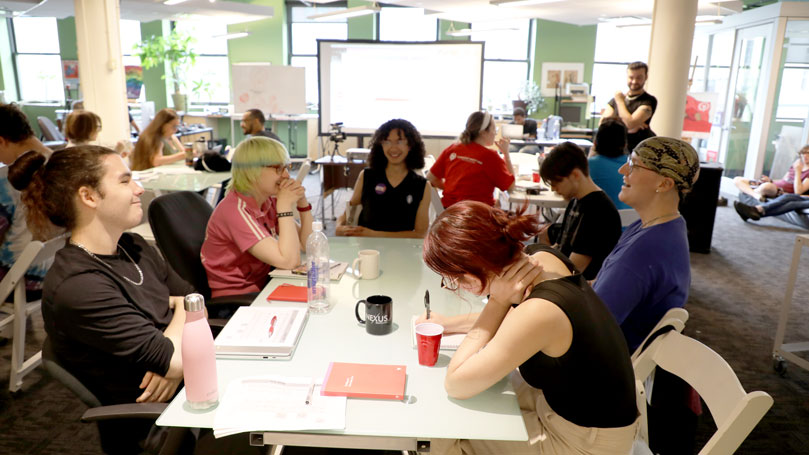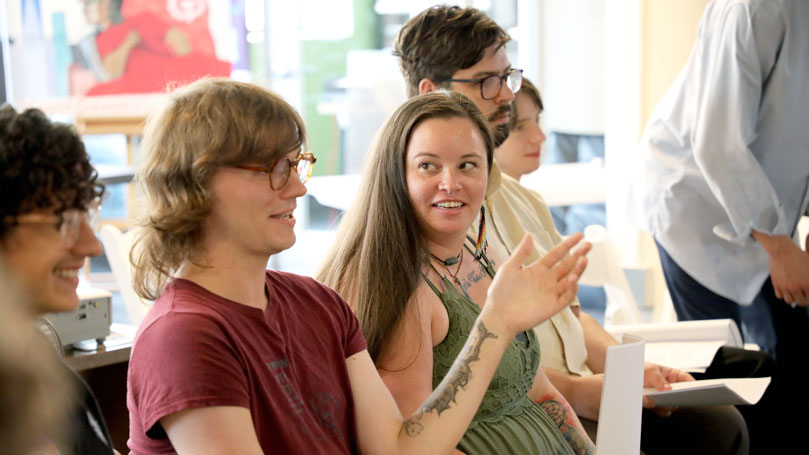
This article was written in conjunction with Mental Health for Activists, an activity of the Working-Class Project. The Working-Class Project functions under the initiative of the CPUSA National Education Commission. Here is a related article: On Communist maturity: Upgrading our leadership skills.
Discussion that leads to united action is the foundation of any collective. Discussion allows members to bring their observations and understandings together to seek one that is greater than that of the individual. This process generates the knowledge needed to produce objectives and guide action. For discussion to be productive, it needs to be purposeful and conscious. Otherwise, it has the potential to delay activity, sow confusion, and destroy the bonds of the collective.
To provide the positive outcomes of discussion, we posit that people must be aware of their subjectivity and have the skills of comradely discussion. In the following, we seek to provide an overview of these concepts for people to take to their next meeting.
Subjectivity
As humans, we operate from a point of subjectivity. This subjectivity is formed by our material conditions — the experiences we have had, the information we have collected, the narrative explanations we have been given. These all form our views of the world and ourselves, which impact the way we process new information. Information that contradicts our subjective experience is viewed as alien and can be met with great resistance if we are not aware of our subjectivity. In a sense, we create our own little islands. If we are not conscious that we are on an island, we believe it is the world.
Most people recognize that other islands exist and are drawn to explore them. There are many ways we sail to other people’s islands and invite them to ours. Even so, we tend to live in small groupings, which we form with people who share similar subjectivities. To most, this looks like romance, family, and friendship. These relationships help raise our consciousness of the world and our role in it. However, it is limited to the diversity of the perspectives and experiences to which we are exposed.
As an example, a person from a wealthy family who only has wealthy friends and went to wealthy schools where they were taught the free market is fair and poverty an outcome of individuals’ poor decisions will not, under normal circumstances, be able to understand poverty in any other way. They can hear stories of people struggling to make ends meet, witness homelessness and starvation, and maybe even have a kind heart and donate money or spend time volunteering to mitigate the impacts. However, without awareness of their subjectivity of the issue, they will never begin to understand the systems at play and will default to understanding things that fit their worldview: “Poverty is terrible, but poor people do not use the resources at their disposal to make their lot better.”
Similarly, those with more understanding of the world can fall prey to the same blindness of subjectivity. A man may be dismissive of the struggles of other genders if he is not aware of how they have been indoctrinated by male supremacy as a feature of capitalist rule over them. A white person may have reactionary views if they do not understand the systems that choke BIPOC people and the super-profits these oppressive systems are designed to generate. A union member may be apathetic to struggles of the international working class if they do not understand imperialism’s reliance on national chauvinism as an ideological tool in its drive to control global resources.
Aspects of capitalist ideology still influence us, and we must struggle to overcome those influences within ourselves.
Good comrades need to understand how their subjectivity is shaped by their material conditions and struggle to raise their consciousness beyond those limitations. We must comprehend that we live in bourgeois society, have bourgeois educations, are inundated with bourgeois propaganda, and consume bourgeois media. But it is not enough to simply know that. When we know that we live in the society we do, we can see the shortcomings of those around us who fall prey to bourgeois individualism. We must grasp that since we also live in a capitalist society, aspects of capitalist ideology still influence us, and we must struggle to overcome those influences within ourselves. If we fail to understand our subjectivity, we are prone to petty squabbles, taking reactionary positions, isolating ourselves, and risk breaking the ties of our collectives.
Comradely discussion
The following guidelines are offered to help a person engage in productive discussion within their collectives. Many of these points are related to combatting one’s own subjectivity and propensity towards individualism and come from our clinical knowledge of group and relationship dynamics. While these guidelines can be useful if applied by one person in a collective, a review of these points by all participants is the most likely to generate positive impacts if a collective is struggling with conflict.
1. Understanding one’s own subjectivity
Before entering a discussion, consider how your material conditions have shaped your subjectivity, and how your subjectivity influences your perceptions and understandings of facts. One must be able to grasp they may have an incomplete or incorrect understanding of any given topic of discussion and be willing to learn from the collective. If a person is blinded by their subjectivity, they are prone to offering opinions and analyses that are of no value or have the potential to harm.
Ask yourself:
- What biases do I have that impact my ability to understand or discuss this topic productively?
- Can I overcome these biases in this moment?
- Do I grasp this topic enough to participate meaningfully?
- If not, do I have helpful clarifying questions to ask, or would it be better to further my learning outside of this conversation and remain quiet now? Could my questions be taken as insulting or tactless?

2. Approach conversation with clear intention and awareness of your affective state
Be aware of your motivations and ensure you are operating with the intention to engage in Comradely Discussion. Also be aware of your emotional state, which may be clouding your perception of appropriate engagement.
Ask yourself:
- What is my motivation for engaging in this discussion?
- Does my question have any use beyond provocation?
- Do I have a useful observation or analysis to share?
- Am I seeking personal fulfillment through my engagement in this conversation, or do I hope to support the collective with my insight?
- Is my motivation productive in the context of this discussion?
- What feelings may I be having that could cloud my judgement in this moment?
- Am I hungry, angry, stressed? Have I slept enough recently?
- Am I feeling defeated or hopeless? Am I feeling angry?
Take a deep breath and ask yourself if you can overcome the emotional state here or if you need to withhold yourself from this conversation.
3. Assume that others are participating in good faith
Because we live in a society that is competitive and conflictual it can be easy to fall into a pattern of assuming worst intentions. This mistrust can lead us to listen and respond in a similarly conflictual manner. If we start with the assumption that others are our comrades and participating in good faith, we are more likely to listen to the substance of what they are saying rather than looking for fuel for an argument. That does not mean that every person is operating in good faith, but if we can provide the benefit of the doubt, we can ease tension within ourselves and begin to actually listen.
Ask yourself:
- Am I listening to understand or am I listening to react?
- If I am listening to react, can I redirect my attention or do I need to rethink my motivation for participating today?
- Am I able to restate what I just heard without adding my own thoughts and feelings?
4. Seek commonality in disagreement
Most disagreement stems from misunderstanding statements or an incomplete view of facts. Clarifying these and looking for areas of agreement builds a common understanding of a situation. By looking for commonality in disagreements, we can highlight the unity of the collective, guide conversation closer to truth, and allow members to retain trust in each other even when a topic is not resolved.
Try to:
- Repeat what you heard the person say and ask if you are understanding it correctly.
- If so, seek to relate that to the position or understanding that you hold.
- If you are unable to create that connection, state calmly your position and ask for the other to help you find commonality.
Accept that there may not be universal acceptance of any position, and that further research and reflection may be needed outside of the context of the conversation. Remember the most important achievement is participation in action, even where the expression of analysis is underdeveloped.
5. Limit criticism to what is productive
Criticism should be specific and productive to the conversation. Identifying unrelated flaws to attack a person’s character is not helpful for that person, as they will not receive it. It is also not helpful for the collective, as it increases tension. If a person has claimed a reactionary position on a topic or appears otherwise to be misinformed, try to provide guidance in a non-confrontational way and offer resources or reflections to help them raise their consciousness. By showing a commitment to criticising the view, but not morally rejecting the member, we provide safety for that person to learn and grow and demonstrate a good approach for the collective. If everyone is afraid of being attacked, no one will participate.
Ask yourself:
- Am I criticizing the person, or their view?
- Is my criticism specific?
- Is my criticism relevant to this immediate discussion?
- Can I state it in a way that is not confrontational?
6. Accept criticism insofar as it is productive
Because our subjectivities were formed in bourgeois society, we will inevitably err in our understanding and analysis of things. Further, because facts and conditions change, we will inevitably make mistakes when we are behind in our study. Being open to criticism is being open to growth and learning, though it can feel like a personal attack. We must remember that our subjectivities are imperfect, but that is not a moral judgment on us or our worth as people.
Remind yourself:
- My understanding and analysis will always be imperfect.
- My worth as a person is not tied to my opinions and statements.
- If others are engaging in good faith and offering me criticism, it is not an attack on me.
- I can disagree with a criticism, but I must first listen to understand it before I respond.
- If I am unable to accept the criticism in this moment, I can state that and request to return to it at a later time or in a more private setting.
Summary
We must approach discussion mindfully if we want it to be productive. If we are unaware of the impact of our subjectivities and how we are engaging in discussion, we will distort the conversation and lay the groundwork for petty disputes and disintegration. Engaging with others as comrades will allow us to grow our understanding individually and collectively, which will give us strength to organize and fight.
The opinions of the author do not necessarily reflect the positions of the CPUSA.
Images: People’s World / Flickr


 Join Now
Join Now